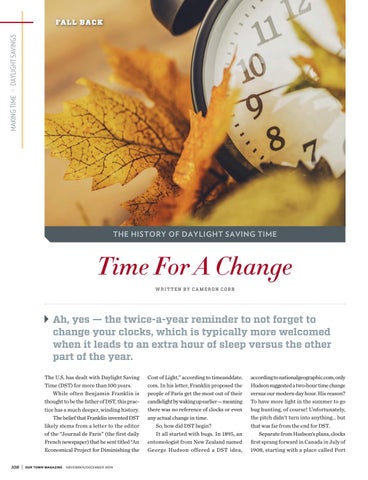108
MAKING TIME >> DAYLIGHT SAVINGS
FALL BACK
THE HISTORY OF DAYLIGHT SAVING TIME
Time For A Change W R ITTEN BY CA MERON COBB
Ah, yes — the twice-a-year reminder to not forget to change your clocks, which is typically more welcomed when it leads to an extra hour of sleep versus the other part of the year. The U.S. has dealt with Daylight Saving Time (DST) for more than 100 years. While often Benjamin Franklin is thought to be the father of DST, this practice has a much deeper, winding history. The belief that Franklin invented DST likely stems from a letter to the editor of the “Journal de Paris” (the first daily French newspaper) that he sent titled “An Economical Project for Diminishing the 108 |
OUR TOWN MAGAZINE
November/December 2019
Cost of Light,” according to timeanddate. com. In his letter, Franklin proposed the people of Paris get the most out of their candlelight by waking up earlier — meaning there was no reference of clocks or even any actual change in time. So, how did DST begin? It all started with bugs. In 1895, an entomologist from New Zealand named George Hudson offered a DST idea,
according to nationalgeographic.com, only Hudson suggested a two-hour time change versus our modern day hour. His reason? To have more light in the summer to go bug hunting, of course! Unfortunately, the pitch didn’t turn into anything… but that was far from the end for DST. Separate from Hudson’s plans, clocks first sprang forward in Canada in July of 1908, starting with a place called Port
